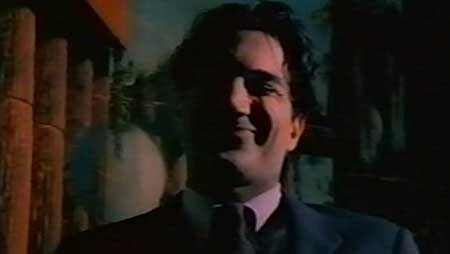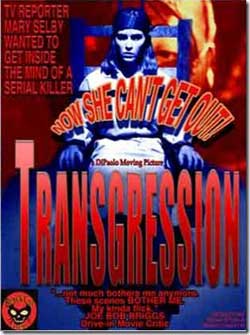SYNOPSIS:
TV reporter Mary Selby wanted to get inside the mind of a serial killer… NOW SHE CAN’T GET OUT!
REVIEW:
According to director Michael P. DiPaolo’s bio, he spent sixteen years recording murder confessions at the Brooklyn District Attorney’s office. He goes so far as to say he has “been in the room with more murderers than most police ever will,” and has drawn inspiration from the over 2,000 confessions he has witnessed, fictionalizing some of them for his movies. So you’d think that if he decided to make a movie that involves a serial killer, he’d bring something new to it, right? A new vision, or at least an original one, right? That’s what I assumed too, but you know what they say about making assumptions…

 Transgression purports itself to be a serial killer movie with a twist, about a TV news reporter named Mary Selby (played by Molly Jackson) who wants to do more than just tell the story of a killer tearing up the city – she wants to understand why he’s doing it. Despite the warnings of her detective boyfriend, Ron (Julio Rodriguez), she makes appeals to the killer via her segments on the nightly news, stating that she feels she understands him, and if he would just reach out to her, she thinks she can help him. Eventually, the masked killer does reach out to her, forcefully, with both hands, and she finds herself in the middle of his games. But is she stuck there, or is she a willing participant?
Transgression purports itself to be a serial killer movie with a twist, about a TV news reporter named Mary Selby (played by Molly Jackson) who wants to do more than just tell the story of a killer tearing up the city – she wants to understand why he’s doing it. Despite the warnings of her detective boyfriend, Ron (Julio Rodriguez), she makes appeals to the killer via her segments on the nightly news, stating that she feels she understands him, and if he would just reach out to her, she thinks she can help him. Eventually, the masked killer does reach out to her, forcefully, with both hands, and she finds herself in the middle of his games. But is she stuck there, or is she a willing participant?
Despite DiPaolo’s supposed first hand experience, this whole movie still comes across as clichéd and dull. You’ve got your usual sexually sadistic, masked killer, cutting up random naked women after having his way with them. Of course he spews cryptic, artsy psycho-babble when he talks, everything sounding like a recitation of dark, brooding poetry as written by Freud. The whole story is telegraphed from the beginning, and it’s no secret who the killer is, nor how the movie will end. Seeing that we start the story at the end and then fill in the story, that filler better be pretty darn interesting. Unfortunately, it turns out this donut isn’t filled with jelly, it’s filled with that bland white cream that no one likes.
So, the story itself isn’t anything special, but there are other parts of a movie experience. Unfortunately, it doesn’t get any better. The acting is pretty atrocious, and it’s no wonder that very few of the actors in Transgression have gone on to do little else in the movie business. They’re stumbling over their lines from the very start, they’re stiff and unconvincing, and they never make you care one bit about them. Then again, what are they supposed to do with this script? The writing at times just makes no sense. Here we’ve got a reporter begging an unknown killer via her news segments, over and over, to make contact, saying she understands, saying she wants to meet him. Then he gets to her, and, no joke, the first thing she says is seriously, “Why me?” Really? That’s the best you’ve got? The most clichéd line in the genre, and it doesn’t even make sense to be here. He picked her because she asked him to pick her! This is but one line of many that will leave the audience frustrated and annoyed.
To give the director some credit, he does attempt to get a little fancy with his set-up. He juxtaposes the killer stabbing his victims and tasting their blood with a priest blessing the communion and the wine, no doubt an attempt to add a little commentary to his film. And throughout, he intercuts scenes from the present, in which Mary is on death row being prepared for her execution (that’s no spoiler, we learn it within the first five minutes), with scenes of flashbacks, but this is overdone and becomes jumbled, the style choice eventually becoming mistaken for bad editing.
I just can’t recommend Transgression to anyone. DiPaolo does have a list of other films that he’s directed, starting back in 1986 with Brutal Ardor, and including such titles as Daddy, Requiem for a Whore, and I Don’t Wanna Feel Nothin’ No More, so I guess it’s possible this particular one was just a weaker of his films. And while I always hate to bash on the lower budget, independently made films, there’s little to enjoy here. It’s all stuff that’s been done better before, and when all was said and done, and I started writing my review, I had to keep checking my notes because it left very little impression on me.
 Horror News | HNN Official Site | Horror Movies,Trailers, Reviews
Horror News | HNN Official Site | Horror Movies,Trailers, Reviews









